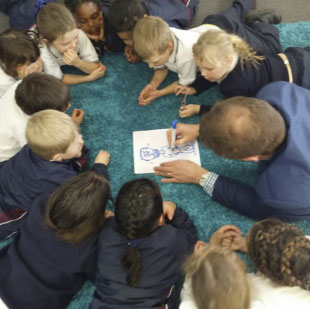Download a printable copy of this article (PDF 415KB)

- Self-esteem needs to be developed carefully.
- Self-esteem is built through success and not false praise.
- Differentiation is how we foster genuine success.
- Healthy self-esteem is the goal – as opposed to low or inflated self-esteem.
- Reward effort and improvement above the highest scores.
I loved my AFL football as a kid. I never really played as an adult but I’ve compensated for that with a healthy capability as a spectator. But the joy – the real, untethered joy that comes with a truly beautiful team sport – comes when you play. And there is no simpler and more pure expression of play than when you are a kid. I loved to play AFL footy.
“Self esteem is the reputation we acquire with ourselves.”
– Nathaniel Branden
Of course, I was rather modestly blessed with the ability to play well. Tall yet awkward, large yet not particularly brave, passionate yet poorly skilled – I had something to offer the team, just not anywhere near as much as Coxy. Coxy was our ruckman and the kind of Under 12 footballer that makes everyone else seem far younger. I swear that Coxy was shaving when most of us were discovering the sandpit at kindergarten.
It made the presenting of the post-game ‘Best On Ground’ (B.O.G.) a bit of a joke. In Round 1 of every season, the coaches and other assisting parents and carers had an easy task in choosing the recipient. Clearly, when one player kicks all of your 8 goals it’s hard not to give him the award. And so Coxy won the B.O.G. in Round 1 … of every season.
Of course, this presented a dilemma in Round 2. Even though he had managed most of our score again, Coxy couldn’t be named B.O.G. in the name of parental fairness. So, the coaches, parent and carers would eventually single out either Mozzie or Willie who were also both good players.
And thus, the ranking system was established. Knowing my place in the pecking order, there was little anxiety about winning the B.O.G. award early in the season. I waited. After all, there were around 13-14 better players than me in my team. Of course, there were also 3-4 worse than me! Thank goodness for those precious teammates.
The intention behind the award is self-esteem. If we all win an award we’ll feel better about our shiny certificate with the tear-away burger voucher and burst with pride, confidence and self-esteem – right? Round 15 comes around and despite barely touching the ball, I collect my B.O.G. award and return to the wooden bench of the change rooms to token applause. I’m not bursting with pride, nor am I ready to play better next week. I merely have had my own suspicions about my ordinary output for the team confirmed and my play will forever reflect the label both the coaches and I have assigned to me. Not exactly self-esteem building is it?
We make this mistake in our schools with alarming regularity. Self-esteem isn’t built through false praise, ritualised reward systems or pats on the back. Self-esteem is built through one thing only – success. Success at MY level. Students, especially those students who struggle to experience regular academic success, don’t need to be compared to others in order to feel more confident or to know they are improving. They need somebody to notice when they improve and to recognise, acknowledge or celebrate it. Put simply, they’ve already determined that comparison with the academic Coxies of their classrooms is futile. But measuring against and conquering their own current standards … that can actually become good fun.
Professional support staff and teacher assistants know this particularly well in our schools. Working with struggling or disadvantaged students, they know that asking them to be the best in the class at spelling will dent self esteem, and thus confidence. But these critical staff members recognise the look that these students give when they spell a word that they were previously convinced that they couldn’t. It’s sheer delight, joy, pride and confidence – not arrogance – just the thrill of genuine achievement.
The lesson for us in schools is to stop the vain attempt to build self-esteem through merit awards, ranking systems, competitive structures and tokens that reinforce already well established student hierarchies. The challenge is differentiating the academic program so that all of our students experience and value their own success.
Through this a healthy – rather than a diminished (leading to self-loathing) or even exaggerated (leading to arrogance) – self-esteem can be cultivated. Imagine what a healthy collective focus on self-esteem could do for your school, your classroom and your students!








